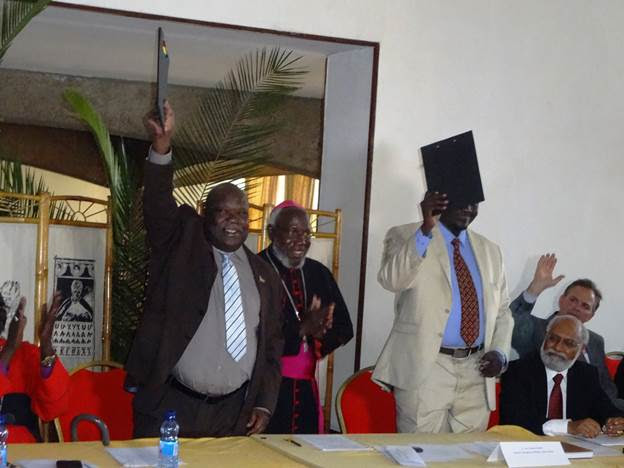Thousands of men, women and children displaced and otherwise suffering from the impact of war in Jonglei – the largest, most populated state in South Sudan – may see their situation become less desperate as a result of mediation efforts led by Hizkias Assefa, a founding faculty member of the Center for Justice and Peacebuilding at Eastern Mennonite University.
Starting in October 2013, Assefa exemplified the patience and wisdom for which he is renowned in Africa to guide formal and informal negotiations between the government of the Republic of South Sudan and the leadership of the South Sudan Democratic Movement/ Army (SSDM/A). He remained for weeks at the negotiating table, as he gently encouraged representatives of the warring parties – initially expressing hatred and suspicion – to keep talking until they found common ground.
These negotiators finally crossed the threshold of the first stage of the peace talks by signing a cease-fire and cessation of hostilities agreement at the end of January. Their military confrontations had caused widespread destruction among the civilian population.
“Although it is rare, it is moving to witness a time when those who have labeled themselves as enemies – and dealt lots of cruelties and suffering on each other – come to realize their common humanity,” Assefa said in an email from Addis Ababa, Ethiopia, where the peace talks were being held. “The discovery and rediscovery of the oneness we all share is one of the inspiring and rewarding moments in peacebuilding.
“The challenge for all of us peace workers and those we work with is how to sustain this realization after the celebrations and random encounters, and to hold it strongly in our consciousness so that it guides our everyday lives and relationships.”
Assefa said an important outcome of the agreement was to create demilitarized peace zones, monitored by international and local observers, and to open up corridors for badly needed relief and humanitarian assistance for hundreds of thousands affected in the area.
Another point of agreement was that the SSDM/A would stay neutral in the current outbreak of hostilities between those loyal to President Salva Kiir (Mayardit) and those loyal to Kiir’s former vice president, Riek Machar. Assefa said such neutrality would help dampen the national-level conflict and create an environment conducive for the opposing parties to work through their differences through negotiations.
“This agreement has created an atmosphere of confidence and good will among the parties that should enable us to deal with the political, economic and social root-causes of the conflict – hopefully with less animosity and intransigence,” Assefa said.
A group of church leaders in the region, called Church Leaders Initiative, invited Assefa to be the lead mediator in these peace talks, after they managed to persuade the leadership of both parties to try negotiating.
The region of Sudan, South Sudan and Darfur has been torn by conflict since the end of Anglo-Egyptian rule in the mid 1950s: the First Sudanese Civil war lasted from 1955 to 1972; the Second Sudanese Civil War from 1983 to 2005; and the Darfur War from 2003 to 2010. The price paid by the people of this region is incalculable. Millions killed and millions fleeing their homes. Women and girls raped. Little possibility of infrastructure development, such as the building and running of businesses, schools and hospitals.
On July 9, 2011, most of the world applauded as South Sudan held a largely peaceful referendum to achieve independence from Sudan and set up a democratically elected government.
Assefa has encouraged South Sudanese leaders and their allies to recall that time of hope in the summer of 2011 and to find a new way forward, where the inevitable disagreements about governing that arise along the way do not mean resorting to brutal warfare.
Barring unforeseen developments, Assefa remains committed to teaching “Philosophy and Praxis of Forgiveness and Reconciliation” May 26-June 3 at EMU’s Summer Peacebuilding Institute, where he has taught each summer since 1994.
